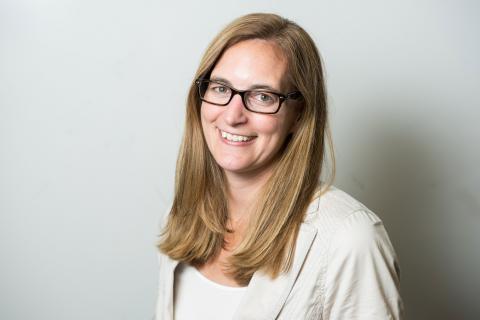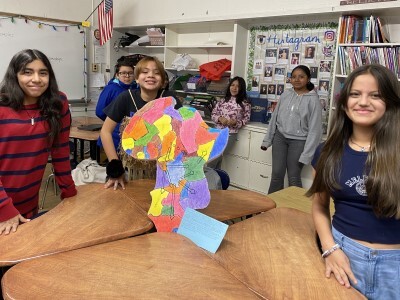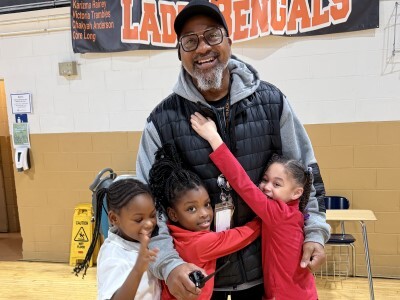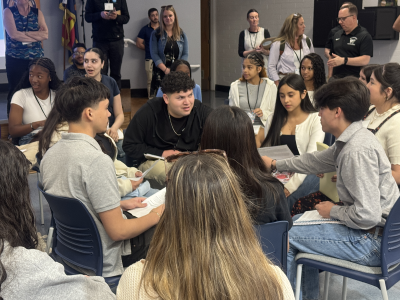Transform Teaching by Transforming Schools
Topics
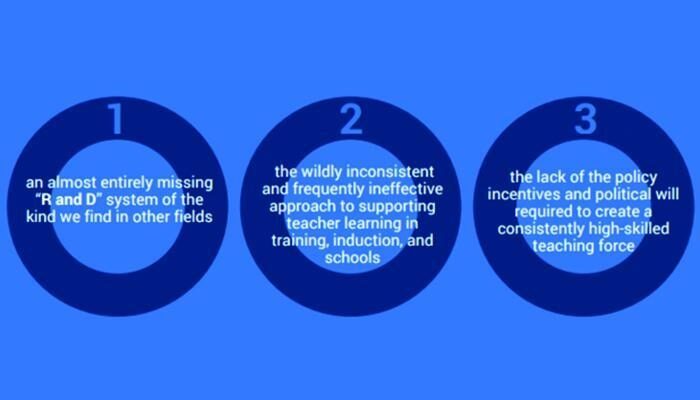
Educators are the lead learners in schools. If they are to enable powerful, authentic, deep learning among their students, they need to live that kind of learning and professional culture themselves. When everyone is part of that experiential through-line, that’s when next generation learning thrives.
A new report identifies 3 problems facing the teaching profession. Interestingly, regional school design efforts are working toward solutions.
Last month, the Transforming Teaching project at the Harvard Graduate School of Education released a white paper, From Quicksand to Solid Ground: Building a Foundation to Support Quality Teaching. It wasn’t the glossy publication that grabbed my attention, nor the snappy title. It was reading the three problems and 12 design challenges for improving teaching that made me giddy.
Why? Over the summer, I worked closely with my colleague, K-12 Program Officer Sarah Luchs, and the team at Getting Smart to produce the blog series and bundle publication Getting Smart on Regional Next Gen School Design. And nearly everything I read in Quicksand resonated with the experiences of the NGLC Regional Funds for Breakthrough Schools that Sarah described in her series.
The Three Problems: R&D, Social Learning, and the Broader Ecosystem
The Quicksand report claims that the three problems facing the teaching profession are missing R&D, inconsistent professional learning, and lack of a supportive ecosystem. The following excerpts from the Getting Smart on Regional Next Gen School Design series demonstrate how the Regional Funds are building up R&D, social learning, and a broader ecosystem to support next generation learning.
There is one difference between the Regional Funds work and the Transforming Teaching project that’s worth noting: the Regional Funds are not specifically focused on transforming the teaching profession. They are focused instead on creating next gen schools to build student success in their regions. But, the Regional Funds initiative, at its heart, really is focused on transforming the teaching profession, because the only way to create next gen schools that build student success is through and with and by teachers:
“Investing in people is critical if the promise of next gen learning is to be realized. It’s educators who help create and enable personalization. Educators put technology to use. Educators co-design and co-operatively manage learning environments (along with students, parents and other individual and organizational influences). To be a next gen educator you must know next gen learning, have experienced it, and be able to model it through your daily actions and interactions.”
Research and Development
- “Can you imagine a local educational ecosystem that embraces R&D or that continually evolves pedagogical strategies and the use of critical resources such as space, time, and talent? Examining what works and doesn’t while never losing sight of the big picture is just good professional practice. The difference in these sites may be the pace at which that iteration and reflection occurs and the commitment to informing a fluid design process that is never really finished.” (A Next Gen School for Every Child)
- “LEAD ENTREPRENEUR: Our schools have to be more fluid and proactive in meeting the changing needs of society and of the students they serve. That’s a new notion and a different expectation for most schools. Regional partner organizations have fewer regulations and greater flexibility in spending than districts and charter organizations. They also have a diverse network to tap ideas, resources, and talent. This positioning makes them a nexus for R&D in next gen learning. NGLC Regional Funds partners serve as champions for an innovation mindset. Their efforts have successfully connected local educators to entrepreneurs, and infused national expertise and ideas into the local ecosystem. New Schools for New Orleans and partner 4.0 Schools exemplify this best.” (7 Roles of a Next Gen Learning Ecosystem)
Social Learning
- “So, how do we position aspiring next gen educators to be successful? Based on our experience working with six partner sites in the NGLC Regional Funds for Breakthrough Schools, we’ve observed a thoughtful mirroring of the elements of next gen learning—specifically building skills in personalized, blended and competency strategies; a commitment to professional learning in which educators exercise choice and become agents of change; and, a flexible design that enables educators to shape and direct a large portion of their own learning—the what, when and how. If you think this description sounds like next gen learning environments for students, you’re right. That’s intentional.” (5 Best Practices For Reimagining Professional Learning This Year)
- “Learning is socially-constructed. The most powerful professional learning has come from the relationships among and across school teams, through face-to-face convenings, coaching, and online or networked interactions. The building of a community has exponentially improved the quality of designs developed by participating schools and accelerated their capacity for change. Leveraging the national network has provided a boost, but local context and shared experience are the most fertile ground for growth of next gen learning.” (5 Best Practices For Reimagining Professional Learning This Year)
Building the Broader Ecosystem
- “ECOSYSTEM BUILDER: Leveraging deep local knowledge and roots, Regional Funds partners are master connectors and networkers. They arrange school visits, host convenings, and promote community dialog and learning events. They tell the story across their local networks, support professional connections, and champion new developments in practices and tools. As each site is a nascent hub of rapidly developing new learning models, they provide inspiration, create opportunities for celebration, and help manage growth and change. Building trusting partnerships is job #1; and, the quality and diversity of these relationships make or break the network.” (7 Roles of a Next Gen Learning Ecosystem)
- “TALENT SCOUT: Before any funds were distributed, the Regional Funds partners spent a good deal of time identifying, recruiting, and welcoming educators in their midst who are curious, forward-leaning, and willing to try something new to better help their students. For example, LEAP Innovations worked with the Chicago Public Education Fund, the district, and afterschool networks to identify educators citywide that may be interested in next gen learning. CityBridge Foundation started the Education Innovation Fellowship to create a pipeline of next gen teaching talent. Sometimes it’s been a surprise to district and charter organization leaders to see who steps forward.” (7 Roles of a Next Gen Learning Ecosystem)
Design Challenges
Of the 12 design challenges identified in Quicksand, I think the Regional Funds offer potentially scalable design solutions for five of them:
- Design Challenge 1: Put the “D” in R&D; invest in developing design-based interventions
- Design Challenge 3: Build a set of intermediaries that would deliver evolving knowledge about teaching
- Design Challenge 5: Build “Teaching Hospital” schools
- Design Challenge 6: Support school leaders and districts in creating environments that prioritize adult learning, particularly with respect to content, pedagogy, and race
- Design Challenge 11: Build next generation competencies, assessments, and school models to support next generation teaching
Design Challenge 11 is the linchpin between next gen school design and transforming teaching. NGLC schools in the Regional Funds sites and our national network are changing their organizational models—including staffing—as they shift their learning models. When schools reject the one-teacher-(isolated)-per-classroom model, the opportunities for professional learning as part of the school design abound. Here are just a few innovations employed by NGLC schools:
- Schools pair master teachers and novice teachers. They differentiate roles, playing to teacher strengths, to include relationship managers, relevance managers, rigor managers, and success coaches.
- They create teacher career pipelines that include resident, associate, lead, and master teacher positions and build from preceptors, lead preceptors, and cohort preceptors to heads of school.
- They partner with a local college to create an Apprentice teacher education Master’s degree program.
- They provide teachers with 130 minutes of planning time daily and 57 days of personalized professional development each year and almost 300 hours annually to engage in collaborative planning, data review, and professional development. They offer 40 observations and 20 one-on-one coaching sessions per teacher per year.
I hope these examples make you as giddy as I am about next gen school design and transforming teaching. What comes next?

